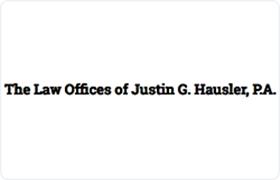Orange City DUI-DWI Lawyer, Florida
Sponsored Law Firm
-
 x
x

Click For More Info:
-
The Law Offices of Justin G. Hausler, P.A.
5570 South US Highway 17-92 Casselberry, FL 32707» view mapCriminal Defense Because Your Case Matters
As a Former Prosecutor, Justin G. Hausler has a wealth of jury trial experience and offers representation regarding all misdemeanor and felony charges.
407-617-1064
Justin G. Hausler
✓ VERIFIEDCriminal, Divorce & Family Law, Accident & Injury, DUI-DWI, Motor Vehicle
Justin G. Hausler has worked in the criminal area of practice since being admitted to the Florida Bar. He began his legal career as a Prosecutor for t... (more)
FREE CONSULTATION
CONTACTMatthew Gunter
Criminal, DUI-DWI, Divorce & Family Law, Divorce
FREE CONSULTATION
CONTACTMark H. Randall
Domestic Violence & Neglect, DUI-DWI, Criminal, Licensing
Status: In Good Standing Licensed: 50 Years
Catherine A Drees
Mental Health, DUI-DWI, Criminal, Constitutional Law
Status: In Good Standing Licensed: 41 Years
John Charles Revis
Wills, Wills & Probate, DUI-DWI, Criminal
Status: In Good Standing Licensed: 50 Years
Ronald Kenneth Zimmet
DUI-DWI, Trade Associations, Personal Injury, Car Accident
Status: In Good Standing Licensed: 50 Years
 Justin Hausler Casselberry, FL
Justin Hausler Casselberry, FL AboutThe Law Offices of Justin G. Hausler, P.A.
AboutThe Law Offices of Justin G. Hausler, P.A. Practice AreasExpertise
Practice AreasExpertise


